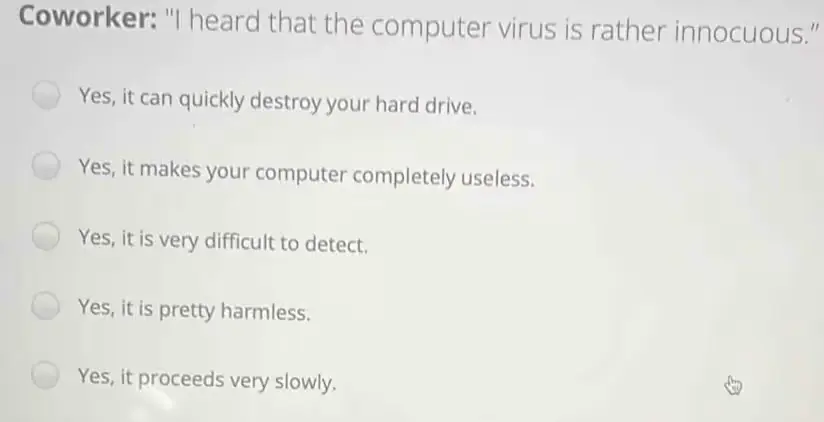Homework Help: Questions and Answers: Coworker: “I heard that the computer virus is rather innocuous.”

a) Yes, it can quickly destroy your hard drive.
b) Yes, it makes your computer completely useless.
c) Yes, it is very difficult to detect.
d) Yes, it is pretty harmless.
e) Yes, it proceeds very slowly.
Answer
First, let’s understand what “innocuous” means:
Innocuous means “harmless” or “not harmful”. It describes something that won’t cause damage or problems.
Given Option: Step by Step Answering
a) Yes, it can quickly destroy your hard drive.
- This is incorrect because it suggests that the virus is harmful and causes damage, which contradicts the meaning of innocuous.
b) Yes, it makes your computer completely useless
- This is also incorrect, as making a computer useless would imply that the virus is harmful, which is not what “innocuous” means.
c) Yes, it is very difficult to detect
- While this might seem related to viruses, it doesn’t directly address the harmlessness implied by “innocuous.”
d) Yes, it is pretty harmless
- This is the correct answer because “innocuous” means harmless, and this option directly reflects that.
e) Yes, it proceeds very slowly
- This option is incorrect because the speed of the virus’s actions does not directly address whether it is harmless or not.
Final Answer
Based on the above analysis, the correct answer is:
d) Yes, it is pretty harmless.
Learn More: Homework Help
Q. What does it mean to transcode information from linear to non-linear texts and vice-versa?
Q. What does it mean to include a non-modular header inside a framework module in programming?